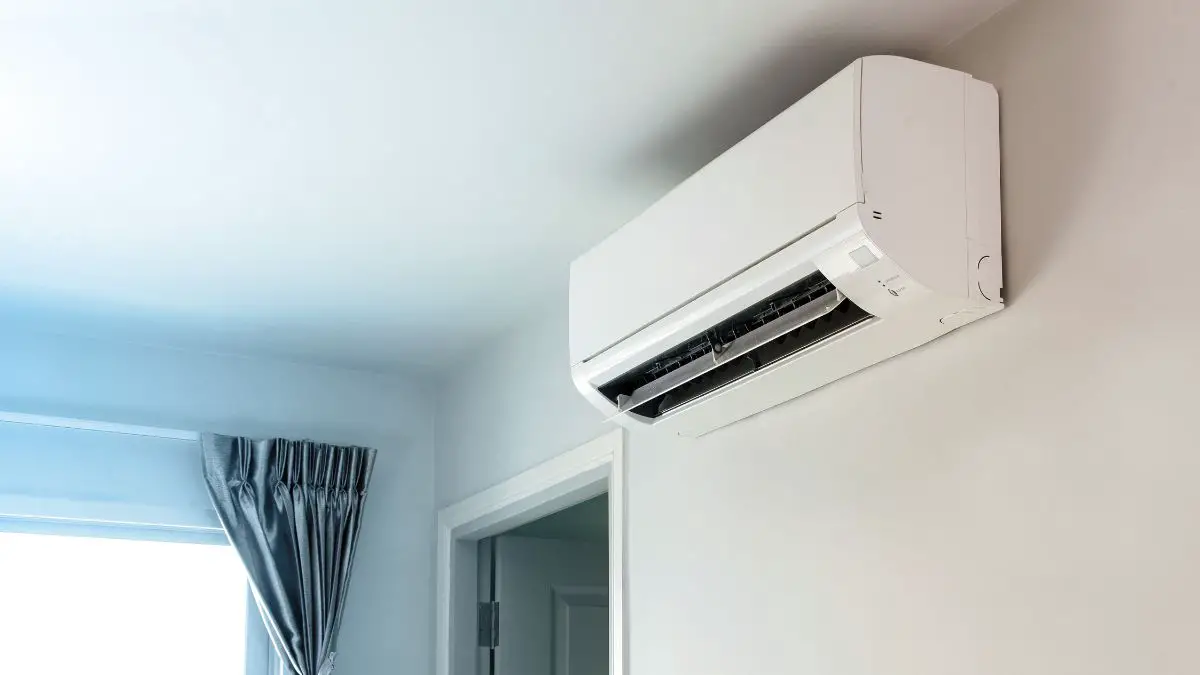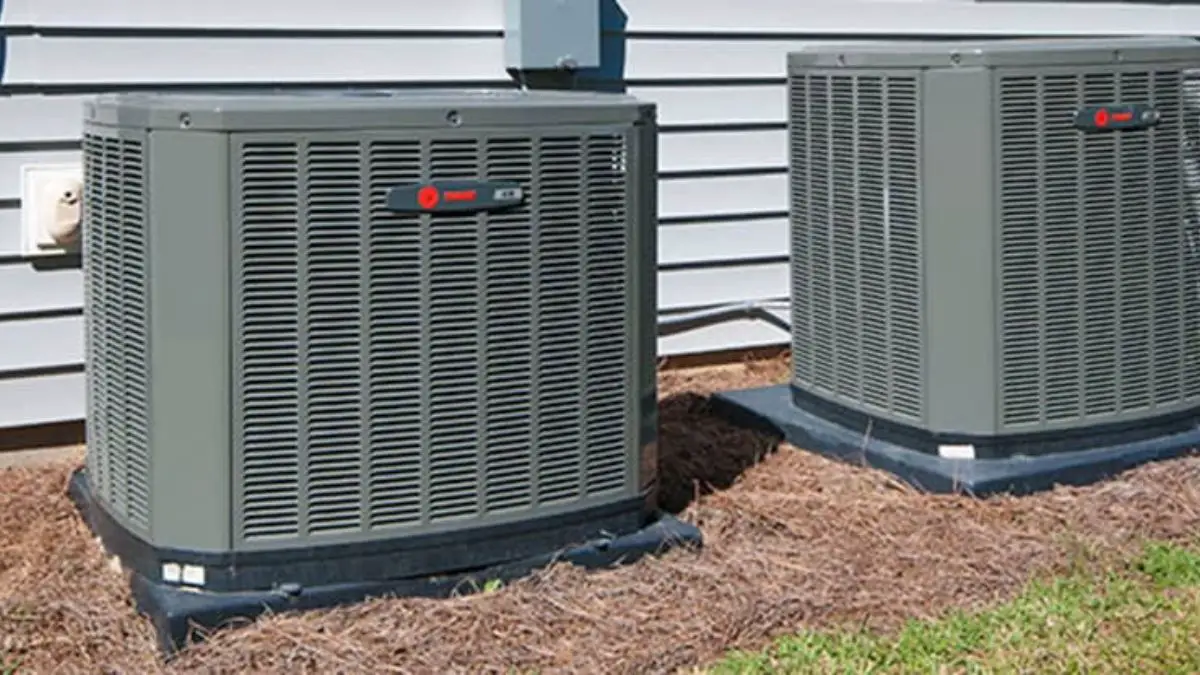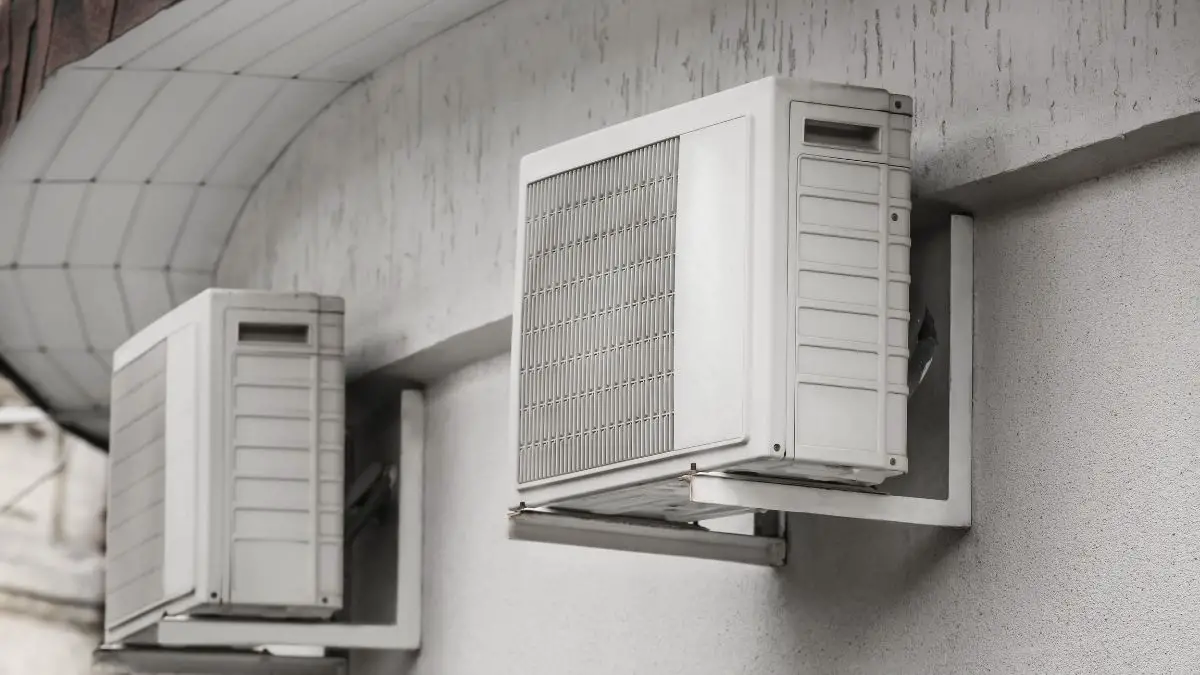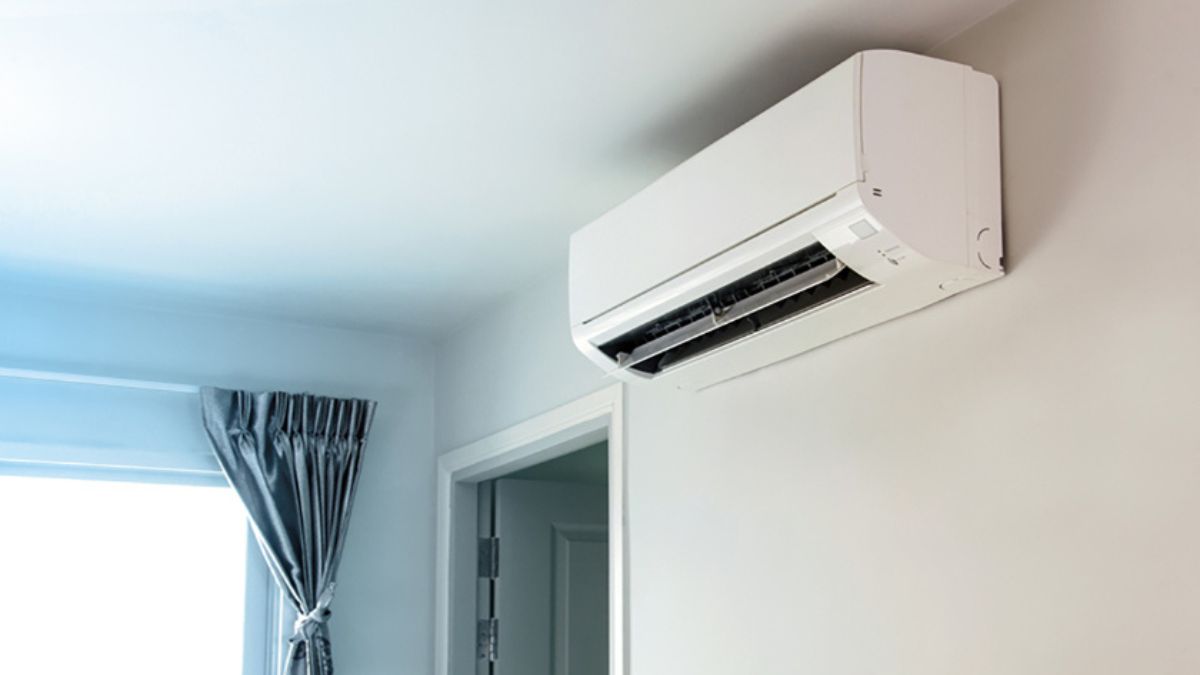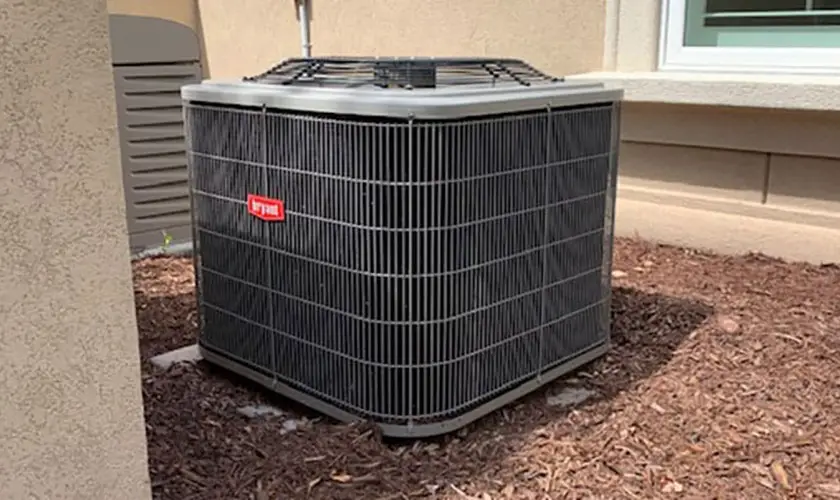You might wonder, how much does an air conditioner weigh? Well, it’s more important than you might think. The weight of your air conditioner plays a crucial role in several aspects, from installation to safety and even energy efficiency.
Window air conditioners can weigh between 38 and 130 pounds. They vary because of how small and large the air conditioner unit may be and how much BTU you want.
Knowing the unit’s weight is essential to support your window frame. Or consider a portable air conditioner. Moving it around could become a strenuous task if it’s too heavy.
Moreover, the weight of an air conditioner can also impact its energy efficiency. Heavier units often have larger cooling capacities, which might lead to higher energy consumption. Therefore, understanding the weight can help you make an informed decision about the air conditioner’s potential impact on your electricity bill.

What is a Window Air Conditioner?
Your window air conditioner, often called a room air conditioner, is a basic yet effective solution for cooling individual rooms. Unlike a portable air conditioner that sits on the floor, you mount this unit on the wall. It’s an ideal choice when you want to keep a specific room cool.
Remember, a window air conditioner is designed to cool one room at a time. So, should you have another room needing cooling, you must plan separately.
One of the key aspects of a window air conditioner is its weight. The weight remains within a specific range, with numerous components comprising the unit. These outdoor and indoor components are integral to the unit’s function and cannot be compromised.
The unit fits perfectly into a cut-out in the wall, with one side exposed to the outside. This design is not just for aesthetics but also for functionality.
One of the advantages of a window air conditioner is its ability to cool the area you frequent the most. Rather than using your main system to cool your entire house, you can use the window unit to cool specific areas, saving energy and money. It’s a win-win situation, especially if there are parts of your house, like the basement, that you rarely use.
Components of a Window Air Conditioner Unit
Like any other appliance, a window air conditioner unit comprises multiple parts. Each part plays a role in achieving the primary goal – to keep the room cool and remove the hot or humid air inside. Despite sounding simple, the circulation process involves several components.
Window Air Conditioner Unit Components
To better understand the weight of the unit, let’s break down these components:
- Refrigeration System: This includes the compressor, condenser coils, and evaporator coils, which are essential for the circulation process.
- Air Circulation System: This consists of the blower and the fan.
- Ventilation System: This system expels hot indoor air to go outside.
- Control System: This is the panel where you control different features, such as temperature, airflow, and air direction.
- Electrical Protection System: This system prevents the unit from overheating and includes a thermostat that monitors the heating.
The most crucial parts of the window air conditioner unit are the compressor, fan, blower, condenser, evaporator, chemical refrigerant, and filter.
The compressor acts as the core of the unit. The fan and blower work together – the fan expels the hot air from your room, while the blower regulates the unit’s internal temperature.
The coils, condenser, and evaporator work to reduce and remove heat and humidity using the chemical refrigerant. And as you might guess, the filter’s job is to filter out any unnecessary particles, ensuring you breathe clean air.
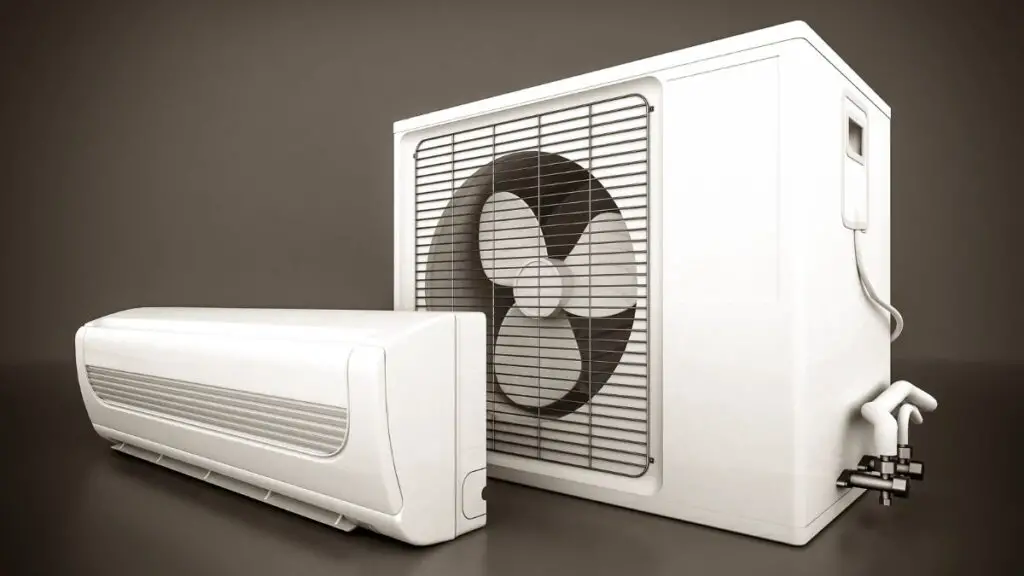
Types of Air Conditioners and Their Weights
Many types of air conditioners have unique features, benefits, and, of course, weights. Let’s explore these different types and understand how their weights can influence your decision-making process.
Central Air Conditioners
First up are the central air conditioners. These are the heavyweights in the air conditioning world regarding cooling capacity and physical weight. A typical central air conditioner can weigh anywhere from 200 to 350 pounds.
The weight is influenced by the size, capacity, and materials used in construction. Despite their weight, central air conditioners are renowned for their efficiency and ability to cool large spaces evenly.
Window Air Conditioners
Next, let’s turn our attention to window air conditioners. These units are compact and designed to fit snugly into a window frame. They’re lighter than central air conditioners, typically weighing between 40 and 80 pounds.
The weight of a window air conditioner can impact its installation, with heavier units requiring sturdy window frames for support. Remember, the weight of your window air conditioner can also affect its energy efficiency.
Portable Air Conditioners
Portable air conditioners offer the advantage of mobility. You can move these units from room to room, providing cooling where needed most.
They weigh between 50 and 80 pounds, making them relatively easy to move around. However, remember that while they are portable, their weight can still pose a challenge if you need to move them up or down stairs.
Ductless Mini-Split Air Conditioners
Ductless mini-split air conditioners consist of an outdoor compressor and one or more indoor air handling units. The outdoor unit can weigh up to 90 pounds, while the indoor units are much lighter, usually around 20 to 30 pounds.
Ductless mini-split air conditioners are known for their energy efficiency and the ability to cool specific zones in your home.
Factors Influencing the Weight of an Air Conditioner
When it comes to the weight of an air conditioner, several factors come into play. Let’s delve into these elements and see how they contribute to the overall weight of your cooling unit.
Size and Capacity (BTU Ratings)
The size and capacity of an air conditioner, often measured in British Thermal Units (BTUs), play a significant role in determining its weight. Larger units with higher BTU ratings tend to weigh more. Why? They contain more materials and components to support their increased cooling capacity.
For instance, a small window air conditioner with a capacity of 5,000 BTUs might weigh around 40 pounds. In contrast, a larger unit with a capacity of 12,000 BTUs could weigh up to 80 pounds. So, when considering an air conditioner’s weight, remember to factor in its size and capacity.
Materials Used in Construction
The materials used in constructing an air conditioner also influence its weight. Units made with heavy-duty metals like steel or copper tend to be heavier. These materials are often used in high-quality air conditioners due to their durability and excellent heat transfer properties.
On the other hand, some modern air conditioners incorporate lightweight materials such as aluminum or plastic in their construction to reduce weight. However, while these units might be lighter, they may not offer the same durability or efficiency as those made with heavier materials.
Additional Features
Finally, the additional features incorporated into an air conditioner can add weight. Features like air purifiers or dehumidifiers require additional components, which can increase the unit’s overall weight.
For example, an air conditioner with a built-in air purifier might weigh more than a similar model without this feature. The same goes for units with dehumidifiers or advanced control systems. While these features can enhance the air conditioner’s functionality, they can also add weight.
How Much Does a 5,000 Window Air Conditioner Weigh?
Here’s a breakdown of the average weights, in pounds, for window air conditioner units with different BTUs. BTU, or British Thermal Unit, is a measure of thermal energy.
| BTU | Approximate Weight (lbs) |
|---|---|
| 5000 | 38 |
| 6000 | 40 |
| 8000 | 58 |
| 10000 | 74 |
| 14000 | 98 |
| 18000 | 110 |
| 22000` | 123 |
| 24000 | 130 |
It’s important to note that you’re unlikely to find a window air conditioner unit much lighter than these weights. Each machine component is optimized for performance, meaning there aren’t currently lighter alternatives for these parts.
What Makes the Window Air Conditioner Unit Heavy?
1. Copper
One of the main factors contributing to the weight of your window air conditioner unit is the materials used in its construction. Copper, for instance, makes up a significant portion of the device.
Known for its excellent heat conduction properties, copper is crucial in removing the hot air from your room and expelling it outside. Copper adds considerable weight to the unit by weighing approximately 0.321 pounds per cubic inch or up to 559 pounds per cubic foot.
2. Aluminum
Aluminum is another material often found in air conditioning units. While it could potentially replace copper, manufacturers typically prefer copper due to its superior efficiency.
Aluminum weighs around 2.699 grams per cubic centimeter or 168.48 pounds per cubic foot. Whether your unit uses copper or aluminum, these materials are primarily found in the compressor, condenser, and evaporator coils.
3. Steel
The housing for the compressor, condenser coils, and evaporator coils is usually made of steel, which weighs around 489 pounds per cubic foot or 0.2833 pounds per cubic inch. This adds a significant amount of weight to the unit.
Remember, the goal of manufacturers isn’t to create the lightest unit possible but rather to deliver a product that provides the best value for customers. For instance, aluminum is lighter than copper, so using it could compromise the unit’s efficiency. Therefore, manufacturers often choose copper despite its heavier weight.
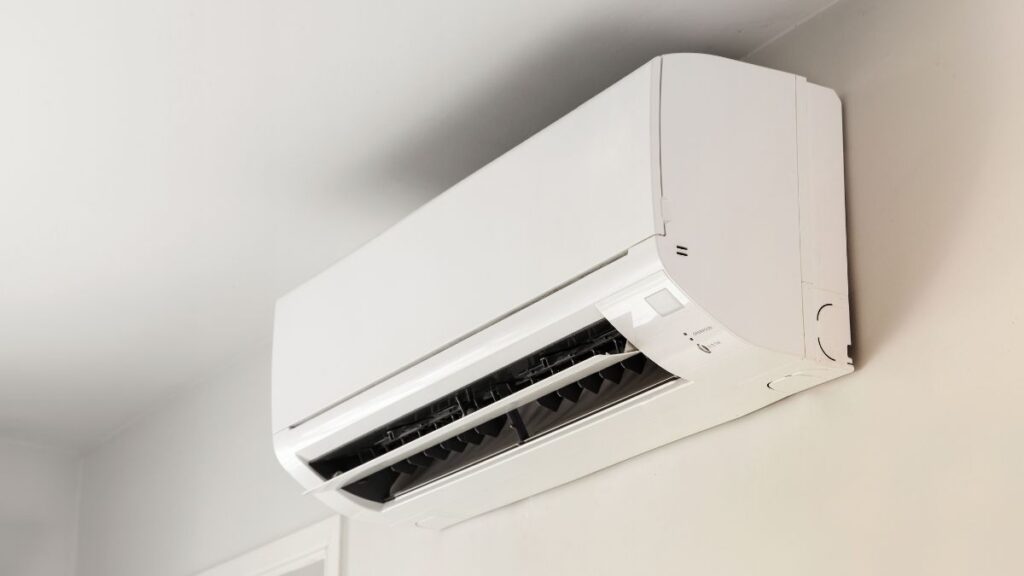
Why the Weight of an Air Conditioner Matters
When you’re in the market for a new air conditioner, the unit’s weight might not be the first thing that comes to mind. However, the weight of an air conditioner can have significant implications in several areas. Let’s explore why the weight of your air conditioner matters.
Installation Considerations
The weight of an air conditioner plays a crucial role during installation. A sturdy window frame is needed to support the weight of window units. A heavier unit might require additional support or professional installation.
Similarly, the weight can influence the installation process for central air conditioners, especially if the unit needs to be hoisted onto a roof or installed in a tight space.
Impact on Energy Efficiency
The weight of an air conditioner can also impact its energy efficiency. Heavier units often have larger cooling capacities, leading to higher energy consumption.
By understanding the relationship between an air conditioner’s weight and energy efficiency, you can make more informed decisions that save money on electricity bills.
Safety Concerns
Safety is another area where the weight of an air conditioner matters. A unit that’s too heavy for its installation location can risk falling, causing property damage or even injury. Therefore, it’s crucial to ensure that the weight of the air conditioner is suitable for its intended location.
How to Find the Right Window Air Conditioner Unit?
Choosing a window air conditioner isn’t just picking the most attractive model. You must consider several factors to ensure your safety and your home’s integrity.
One of the key considerations is the weight of the unit. You need to be sure that it’s suitable for the size of the room where it will be installed.
When it comes to choosing the right BTU (British Thermal Unit) for your air conditioner, it’s not just about the floor area of the room. You also need to consider the height of your ceilings. Remember, air travels; if your ceilings exceed the standard 8 feet, you must adjust the BTU accordingly.
The location of your home also plays a role in your decision. For instance, if your home gets a lot of sunlight through open windows, you must account for that.
Conversely, if your home is often in the shade, that’s another factor to consider. The specific location of the air conditioner within your home matters too. For example, you’ll need a higher BTU if the unit is installed in a kitchen than a living room.
Don’t forget to consider the number of people who will typically be in the room. More people mean you’ll need more BTU.
As a general guide, a 5,000 BTU air conditioner is usually suitable for a room measuring around 100 to 150 sq. ft.
For larger spaces up to 1,500 sq. ft., you might need a unit with 24,000 BTU. But remember, window units can exceed 24,000 BTU, so if you’re looking for something more powerful, that’s an option.
By assessing these factors, you can ensure you choose the right air conditioner for your needs, balancing the unit’s weight and cooling capacity.
| BTU | Square Footage |
|---|---|
| 5000 | 100 to 150 |
| 6000 | 150 to 250 |
| 8000 | 300 to 350 |
| 10000 | 400 to 450 |
| 14000 | 550 to 700 |
| 18000 | 700 to 1,000 |
| 22000` | 1,200 to 1,300 |
| 24000 | 1,400 to 1,500 |
Before installing a window air conditioner, you must evaluate the room thoroughly. Proper air circulation is key to the unit’s effectiveness.
Don’t fall into the trap of thinking that a bigger unit will necessarily serve you better. An oversized air conditioner can lead to wasted energy and unnecessary costs.
Remember, smart coordination of your resources can turn a simple air conditioner into a highly efficient cooling solution for your space.
How to Determine the Weight of Your Air Conditioner
Knowing why the weight of an air conditioner matters is one thing, but how do you determine the weight of your unit? Here are some methods you can use.
Checking Product Specifications
The easiest way to determine the weight of an air conditioner is to check the product specifications. These are usually found in the user manual or the manufacturer’s website. The specifications typically list the unit’s weight and other important information like its size, capacity, and energy efficiency rating.
Contacting the Manufacturer
If you can’t find the weight in the product specifications, another option is to contact the manufacturer directly. They should be able to provide you with the information you need. This can also be a good opportunity to ask other questions about the unit.
Using Online Resources
Finally, you can use online resources to determine the weight of an air conditioner. There are many websites and forums where users share information about different models, including their weights. Just be sure to use reputable sources to ensure the information is accurate.
In conclusion, the weight of an air conditioner is an important factor to consider when purchasing a new unit. By understanding why it matters and how to determine it, you can make more informed decisions and choose the right air conditioner for your needs.

How to Make Sure the Weight Distribution is Good
Strengthen the Support
Sometimes, your window or wall might not be as robust as expected. It’s not worth risking potential damage to your home.
One solution is to bolster the unit from the outside. There are many ways to do this, but a common method is using wood. Consider using shelf brackets for heavier loads if your air conditioner is particularly heavy.
Maintain Level
Ensure your air conditioner is installed level. An angled unit won’t function as efficiently as it should.
Ensure a Solid Foundation
Your air conditioner will perform best in a well-insulated environment. If your window unit doesn’t have additional insulation, consider purchasing some to enhance its performance.
Additional Considerations
Even after you’ve found the perfect window air conditioner, there are still a few things to keep in mind. For instance, make sure your home’s electrical system can handle the unit’s power requirements. Some window air conditioners require more power than you might expect.
If energy efficiency is a priority for you, remember you have options! The weight of an air conditioner can be related to its energy efficiency ratio (EER), which indicates how many BTUs the unit uses for each watt of power. So, if you choose an energy-efficient model, the ratios in the tables above might differ.
Where to Install Your Window Air Conditioner
Now that you’re familiar with the best practices for installing a window air conditioner let’s consider where you might install it:
- Double-hung Windows
- Sliding Windows
- Casement Windows
- Wall
While most standard designs are intended for double-hung windows, models are also suitable for other types of windows. Before installation, check the unit’s dimensions and compatibility with your window type.
FAQs About How Much Does an Air Conditioner Weigh
How much does a central air conditioner weigh?
A central air conditioner can weigh anywhere from 150 to 400 pounds. This includes the weight of the outdoor condenser unit and the indoor evaporator coil. The weight can vary significantly based on the unit’s size and cooling capacity.
Does the weight of an air conditioner affect its cooling capacity?
No, the weight of an air conditioner doesn’t directly affect its cooling capacity. The unit’s BTU rating, not weight, determines the cooling capacity. However, larger, more powerful air conditioners tend to be heavier because they contain more or larger components.
Can the weight of an air conditioner cause damage to my window or wall?
Yes, if an air conditioner is too heavy for the window or wall where it’s installed, it can cause damage. If necessary, you can reinforce the area with additional support.
How Heavy is a Window Air Conditioner Unit?
As mentioned before, give or take, a couple of pounds can be anywhere from 38 to 130 pounds. The weight will vary depending on the model and company that you are looking at. The table below estimates how many pounds each common BTU will look like.
Conclusion
We do not know! With more testing and interest in creating more environmentally friendly options, manufacturers may develop options that reduce weight and costs.
Technology is constantly evolving, so there is a better chance of asking when the weight will go down than if it will.
However, the average weight is between 38 and 130 pounds. It all depends on what BTU you are looking for in your space!



